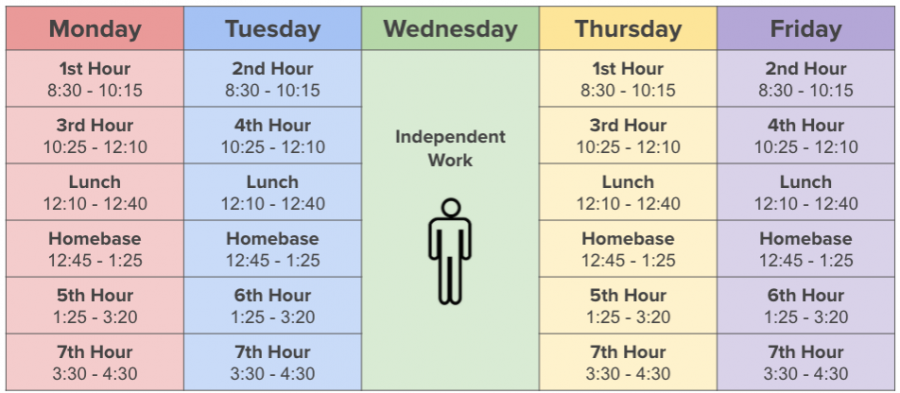Students and teaching staff adjust to Block Schedule
The implemented block schedule for the 2020-21 school year has presented both new challenges and advantages for students and staff alike.
The block schedule, which started at the beginning of the fall semester, consists of several major changes. Students meet with teachers twice per week with an asynchronous, independent workday on Wednesdays, meaning that students meet with teachers less frequently each week while the longer class hours actually result in an overall decrease in class time.
English and advisory teacher Kristina Jackson said that it has been difficult adjusting to this new set-up, because it requires a different teaching approach than in previous years.
“Some challenges of the new schedule are planning the pacing time for lessons and keeping students engaged during that block of time,” said Jackson.
This includes the use of new technologies, and a completely different teaching format: Schoology. “I had to change how I prepare and deliver lessons due to being online and using a platform that is new to me,” Jackson said.
Pioneer senior Ariel Halpern said she finds it especially hard in some classes as the new technology remains a struggle for some teachers. “Teachers who are not good with adapting to the technology, the class either ends way too quickly or stays way too long, for no reason,” Halpern said. Technology, however, is not the only challenge. “The hardest thing for me with the new schedule is fitting in homework. With all the college stuff and all, I wish we had more time for homework,” said Halpern.
The goal of the new block schedule was to create consistency throughout all the high schools in the district. In a video created for district families to explain the changes, Skyline Principal Cory McElmeel said the purpose of altering the schedule was “upholding the fidelity of our curriculum and instruction” as the school year started.
“One of the challenges that we’ve had over the summer as we’ve been preparing for our restart to the 2020-21 school year has been really a focus on consistency across all of our schools, most importantly that we can deliver a very robust curriculum to all of our students,” McElmeel said. “To do this to scale across all five buildings, we have created a common daily schedule, and we’re moving to a semester schedule in all of our schools.”
Huron principal Janet Schwamb, who also was involved in the schedule planning, added that she thinks the new schedule will be helpful. “There are real distinct advantages to being in a block schedule,” Schawmb said. “It gives you a longer period of time.”
Jackson thought a block schedule enabled increased class participation since it gives teachers the “ability to expand and cover more material in a day and the ability to have more frequent group discussions around material.”
Halpern said that the block schedule has helpful intentions and is not the most challenging aspect of this year. “The thing that has impacted my learning is spending eight hours a day on the computer. How do you not when it has to be online?” he said. “ I think that in-person, the block schedule actually might be so much more beneficial for education.”
McElmeel also recognized the importance of time management under the new schedule, as it presents challenges to students in how they learn and interact with the school. “We have to be conscious of the environment we’re stepping into, in which our students will need to be somewhat self-managers of the pace and learning environment within our system. And so as a result we’ve been thoughtful about the time and the amount of content and curriculum and connections they can make within a given day,” he said.
The block schedule may have been the best option considering the situation. “No matter what, people will say what a school system chose is stupid. You cannot please everyone no matter what you do,” Halpern said. “If I was in their shoes, I would have to face all these difficulties in trying to allow for learning and development over the computer.”


